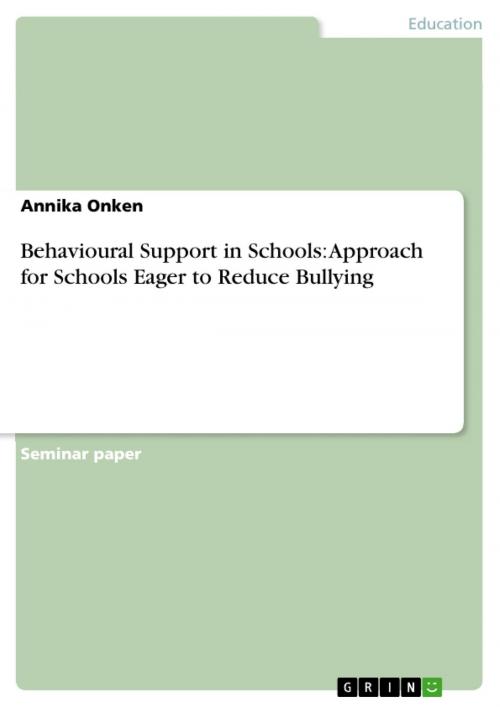Behavioural Support in Schools: Approach for Schools Eager to Reduce Bullying
Nonfiction, Reference & Language, Education & Teaching, Educational Theory, Educational Psychology| Author: | Annika Onken | ISBN: | 9783640464777 |
| Publisher: | GRIN Publishing | Publication: | November 5, 2009 |
| Imprint: | GRIN Publishing | Language: | English |
| Author: | Annika Onken |
| ISBN: | 9783640464777 |
| Publisher: | GRIN Publishing |
| Publication: | November 5, 2009 |
| Imprint: | GRIN Publishing |
| Language: | English |
Seminar paper from the year 2009 in the subject Pedagogy - School Pedagogics, grade: 75%=deutsche 2, University of Queensland, course: EDUC7002 Behavioural Support in Schools, language: English, abstract: The approach I suggest here for schools eager to reduce bullying on the system level constitutes a whole-school approach. Such an approach should inform, obligate and mobilise. In order to reach out to all sections composing the school life that is, students, parents and all staff, and involve those into the approach a school wide policy is needed to proclaim the schools stand on the problem and provide principles and guidelines about how to address the problem. Rigby (2003) suggests that the policy should be 'widely disseminated' (p. 28) in order to reach at best everyone involved with the school. Furthermore, parents who are not that fluent in speaking the English language should have access to translated versions of the policy (p. 28). This whole school approach, furthermore, has to be acted out on the group and individual level in order to fulfil its purpose. Teachers can use cooperative learning as a means to reduce bullying by building interpersonal relationships in everyday class. This approach to learning supports the idea of students working together on a shared task in small groups. In contrast to normal group work cooperative learning binds the members of a group together through the task solving process which can only be maintained as a team. This shared responsibility between the team members should be understood as 'positive interdependence' (Gillies, 2003, p. 37). To continue the whole school approach on the individual level there are several options for teachers and staff. It should be the main aim to help victims as well as bullies. The 'No-Blame Approach' suggested by Rigby and Thomas (2003) can be used to mediate between the two parties by interviewing them separately.
Seminar paper from the year 2009 in the subject Pedagogy - School Pedagogics, grade: 75%=deutsche 2, University of Queensland, course: EDUC7002 Behavioural Support in Schools, language: English, abstract: The approach I suggest here for schools eager to reduce bullying on the system level constitutes a whole-school approach. Such an approach should inform, obligate and mobilise. In order to reach out to all sections composing the school life that is, students, parents and all staff, and involve those into the approach a school wide policy is needed to proclaim the schools stand on the problem and provide principles and guidelines about how to address the problem. Rigby (2003) suggests that the policy should be 'widely disseminated' (p. 28) in order to reach at best everyone involved with the school. Furthermore, parents who are not that fluent in speaking the English language should have access to translated versions of the policy (p. 28). This whole school approach, furthermore, has to be acted out on the group and individual level in order to fulfil its purpose. Teachers can use cooperative learning as a means to reduce bullying by building interpersonal relationships in everyday class. This approach to learning supports the idea of students working together on a shared task in small groups. In contrast to normal group work cooperative learning binds the members of a group together through the task solving process which can only be maintained as a team. This shared responsibility between the team members should be understood as 'positive interdependence' (Gillies, 2003, p. 37). To continue the whole school approach on the individual level there are several options for teachers and staff. It should be the main aim to help victims as well as bullies. The 'No-Blame Approach' suggested by Rigby and Thomas (2003) can be used to mediate between the two parties by interviewing them separately.















